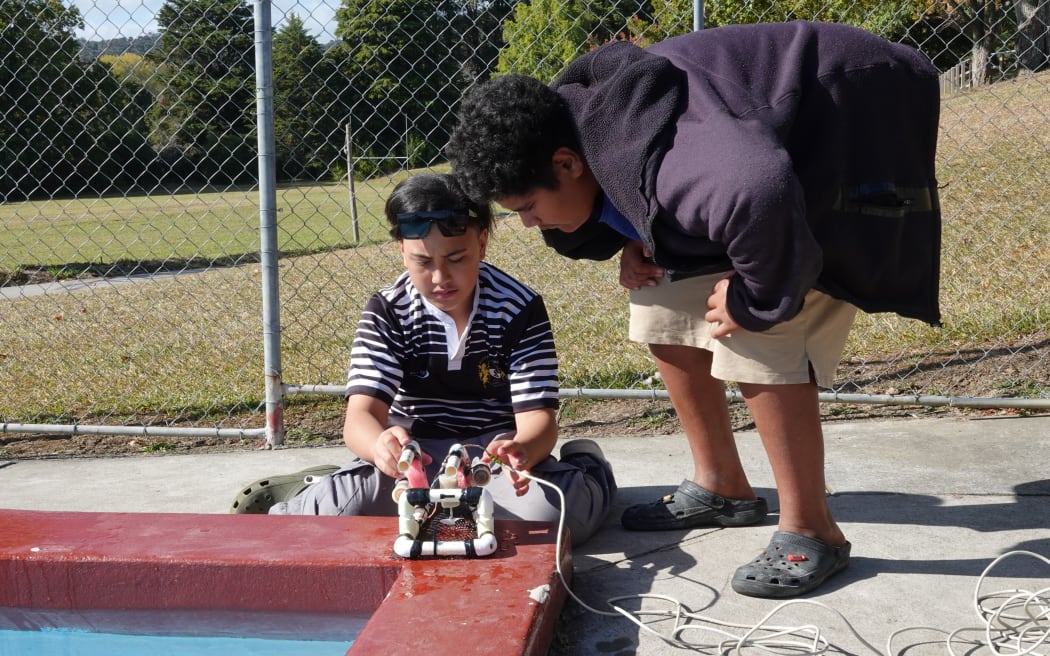
Motatau 12-year-olds Te Maioha Tipene, left, and Zacchaeus Tua test their aquabot in the school pool. Photo: RNZ / Peter de Graaf
It's a long way from Motatau to America - but it's a journey a group of kids from this remote Northland valley are determined to make to compete with the best in underwater robotics.
The four Motatau School pupils, aged 12 and 13, placed second in a regional underwater robotics competition, earning them the right to compete in the upcoming world championships.
They are now fundraising frantically to get themselves, their teachers and parents to Washington DC - and their cash-poor but big-hearted community has swung in behind them.
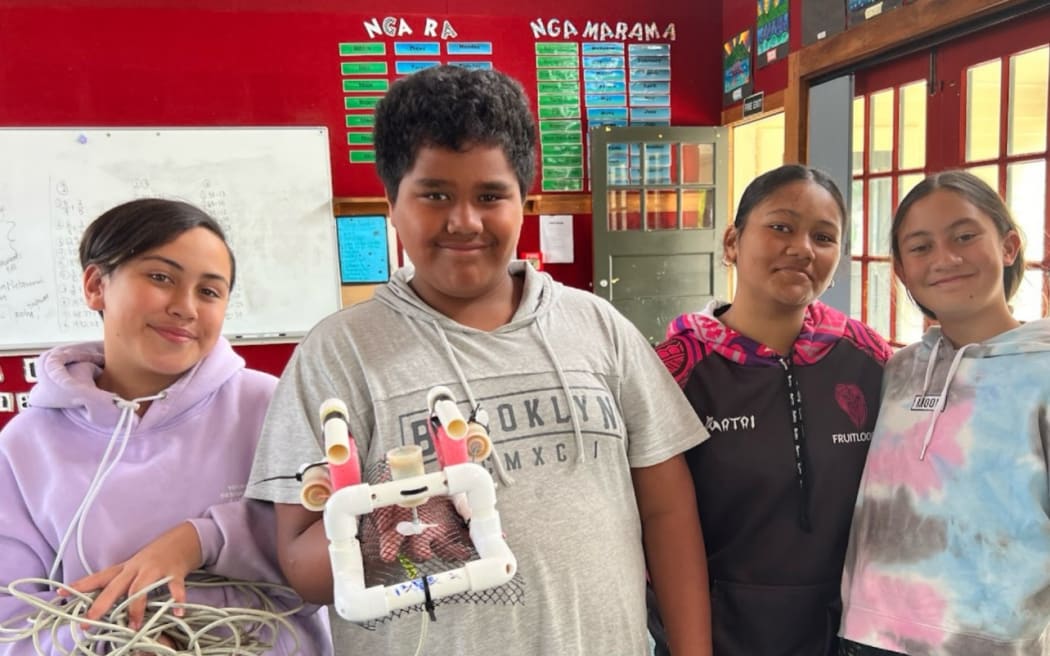
Motatau School’s aquabotics team, from left, Te Maioha Tipene, Zacchaeus Tua, Christina Brown and Aumaarire Prime. Photo: RNZ / Peter de Graaf
Teacher Emma Marsh said a local trust gave the school a chance to take part by providing five robot kitsets and a tutor, the lawyer-turned-aquabot-expert Gareth Bodle.
"The aquabotics programme was introduced to us by our whānau at He Iwi Kotahi Tatou Trust in Moerewa. They were looking at funding some schools - we were keen, so we put out hands up, and what that gave us was an opportunity to open our kids' minds to technology and science-based activities," she said.
Each team taking part had to assemble the remote-operated vehicle from a jumble of PVC pipes, wires and motors, come up with their own improvements, then compete in a series of underwater challenges such as retrieving objects from a pool and completing an obstacle course.
Marsh said the programme taught the kids a raft of skills, from teamwork to power tools.
"The good thing about aquabotics is it teaches our students a lot of patience. They do many, many experiments where things work, and things don't work. There's a lot of coming down to the pool testing it. There's a lot of frustration, but a lot of patience."
Twelve-year-old Zacchaeus Tua said as well as placing second in the Northland championships, his team won an award for using a 3D-printer to create a better motor bracket, improving the aquabot's performance.
"It was a bit broken, so we fixed it up, and now it's ready to roll to America. Yeah, we will win," a confident Zacchaeus said.
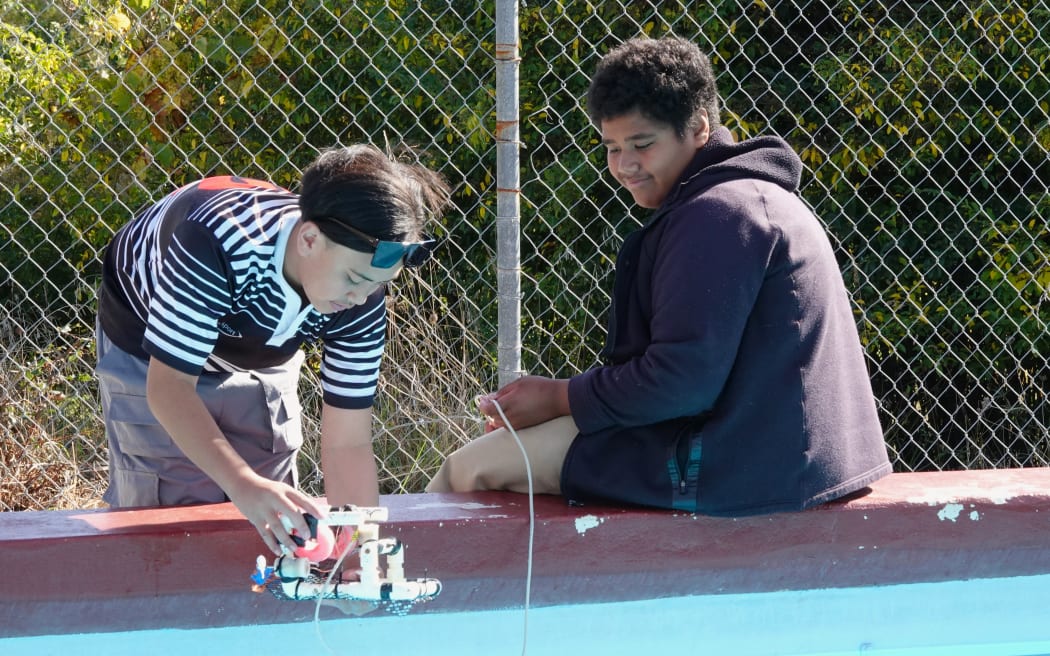
Motatau 12-year-olds Te Maioha Tipene, left, and Zacchaeus Tua test their aquabot in the school pool. Photo: RNZ / Peter de Graaf
Team-mate Te Maioha Tipene, 12, was also hopeful of a victory in Washington, but noted they'd face stiff competition.
"We'll be up against 20,000 people there. But yeah, I think we have a chance."
Te Maioha said the team's more immediate challenge was raising enough money to pay for the trip.
"We have a Givealittle page [Motatau WAIBOTS ki Amerika], we've also been doing heaps of raffles, we've done hāngī, and we had a stall at our swimming sports."
So far they had raised $23,000. They needed just over $60,000.
Another team member - Christina Brown, 13 - said fundraising in Motatau had a distinctly rural favour.
"When we do raffles it's usually a pig or cow. In Motatau-Matawaia, we're out in the wops, on the farm, so one of us will donate a cow or a pig, we'll cut it up, and whoever wins will get the meat for the whānau."
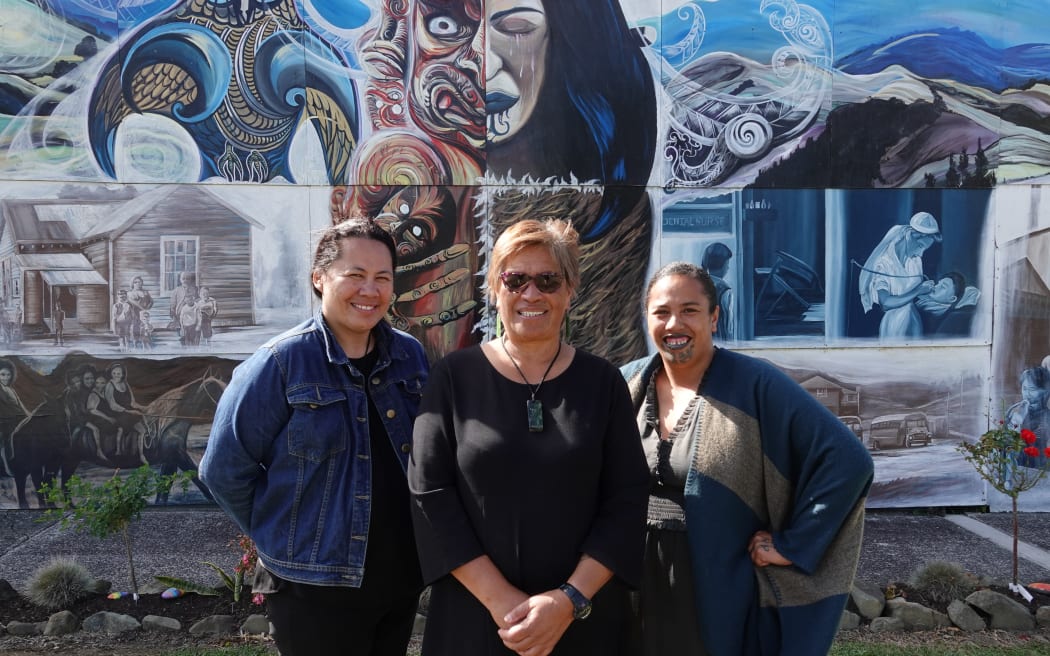
Motatau School tumuaki (principal) Donna Adams with teachers Emma Marsh, left, and Roimata Maimai-Tua. Photo: RNZ / Peter de Graaf
Tumuaki (principal) Donna Adams said the school was about 98 percent Māori, most of whom belonged to the iwi Ngāti Hine.
Motatau was not a wealthy area so she had been moved by the level of community support.
"We are going hard out, trying to get donations, sponsorship and fundraising ourselves, and we're really, really proud of the fact that a lot of our locals have come in behind us to support our kids. Our local iwi and hapū have come in behind then as well, our marae, and of course our whānau themselves."
Christina said she had learnt a huge amount through aquabotics, including perseverance, planning and teamwork.
"You need teamwork, because you can't do it just by yourself. And heaps of technical stuff, like buoyancy, drag, all of that."
Christina said she had never travelled outside the North Island and couldn't wait to get to America.
"I'm excited, because we're going with our team, and then our team's family, and our teachers. It's been really cool."
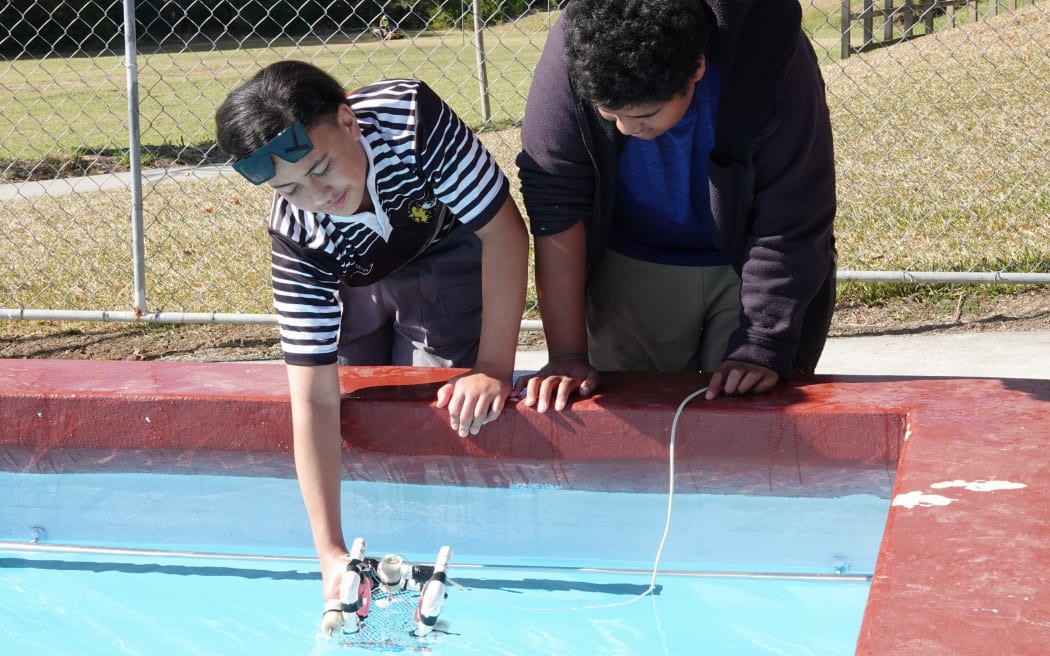
Motatau 12-year-olds Te Maioha Tipene, left, and Zacchaeus Tua test their aquabot in the school pool. Photo: RNZ / Peter de Graaf
Team member Aumaarire Prime, 12, was quietly confident her team could raise the money.
"Hopefully, if we just stick to it and work hard. And if it all works out I just want to say a big thank you to all the family and friends who supported us."
Marsh hoped to take the students to some of Washington's top science museums and Wallops Space Flight Centre in Virginia, a launch base for both NASA and Rocket Lab.
They would also visit a top marine science institute, with the aim of applying what they learned to improving the health of their awa (river).
The team took its name, Taikirau, from the stream that flowed past the school.
Marsh said opportunities for learning science at small, rural schools were limited.
"So we're ever so grateful to He Iwi Kotahi Tatou Trust for giving us the chance to open our kids' eyes to what's out there and what's possible," she said.
Adams said the programme had opened up a whole new world for the kids from Motatau.
"That's the best thing about his whole kaupapa. These kids come from small, rural communities, and it's just the opportunity to go outside of our valley, outside our hapū, outside of New Zealand actually .. it's a once in a lifetime opportunity," she said.
Tutor Gareth Bodle said the team was talented and well-balanced, with strong science, maths and engineering design coupled with good driving skills and writing ability across the four members.
Aquabots had given them a chance to extend and challenge themselves, he said.
The 2024 SeaPerch international aquabotics challenge will take place at the University of Maryland on 31 May and 1 June.
Motatau School is in an isolated area about 25km south of Kawakawa.
Christina has since started high school at Bay of Islands College in Kawakawa, and Aumaarire has moved to Oromahoe School.
If the trip goes ahead the team will also visit New York and Disneyland in Los Angeles.
Oromahoe School - another rural Northland school - took out first and third place in last year's regional aquabotics competition, or Waibotz as the programme is known in the North.

